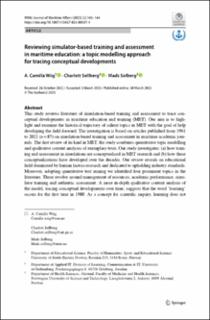| dc.contributor.author | Wiig, Astrid Camilla | |
| dc.contributor.author | Sellberg, Charlott | |
| dc.contributor.author | Solberg, Mads | |
| dc.date.accessioned | 2024-04-04T08:40:34Z | |
| dc.date.available | 2024-04-04T08:40:34Z | |
| dc.date.created | 2023-04-17T17:44:29Z | |
| dc.date.issued | 2023 | |
| dc.identifier.citation | Wiig, A. C., Sellberg, C., & Solberg, M. (2023). Reviewing simulator-based training and assessment in maritime education: a topic modelling approach for tracing conceptual developments. WMU Journal of Maritime Affairs, 22(2), 143-164. | en_US |
| dc.identifier.issn | 1651-436X | |
| dc.identifier.uri | https://hdl.handle.net/11250/3124770 | |
| dc.description.abstract | This study reviews literature of simulation-based training and assessment to trace conceptual developments in maritime education and training (MET). Our aim is to highlight and examine the historical trajectory of salient topics in MET with the goal of help developing the field forward. The investigation is based on articles published from 1961 to 2021 (n = 87) on simulation-based training and assessment in maritime academic journals. The first review of its kind in MET, the study combines quantitative topic modelling and qualitative content analyses of exemplary texts. Our study investigates: (a) how training and assessment in simulations are conceptualised in MET research and (b) how these conceptualisations have developed over the decades. Our review reveals an educational field dominated by human factors research and dedicated to upholding industry standards. Moreover, adopting quantitative text mining we identified four prominent topics in the literature. These revolve around management of resources, academic performance, simulator training and authentic assessment. A more in-depth qualitative content analysis of the model, tracing conceptual developments over time, suggests that the word ‘learning’ occurs for the first time in 1980. As a concept for scientific inquiry, learning does not gain prominence in the literature on simulation in MET before 2021. Our results suggest some future directions of research and offer a methodological framework for future reviews in maritime affairs that combines quantitative topic modelling with qualitative content analysis. | en_US |
| dc.language.iso | eng | en_US |
| dc.relation.uri | https://link.springer.com/article/10.1007/s13437-023-00307-4#citeas | |
| dc.rights | Navngivelse 4.0 Internasjonal | * |
| dc.rights.uri | http://creativecommons.org/licenses/by/4.0/deed.no | * |
| dc.title | Reviewing simulator-based training and assessment in maritime education: a topic modelling approach for tracing conceptual developments | en_US |
| dc.type | Peer reviewed | en_US |
| dc.type | Journal article | en_US |
| dc.description.version | publishedVersion | en_US |
| dc.rights.holder | © The Author(s) 2023. | en_US |
| dc.source.pagenumber | 143-164 | en_US |
| dc.source.volume | 22 | en_US |
| dc.source.journal | WMU Journal of Maritime Affairs (JoMA) | en_US |
| dc.source.issue | 2l | en_US |
| dc.identifier.doi | https://doi.org/10.1007/s13437-023-00307-4 | |
| dc.identifier.cristin | 2141393 | |
| dc.relation.project | Norges forskningsråd: 316212 | en_US |
| cristin.ispublished | true | |
| cristin.fulltext | original | |
| cristin.qualitycode | 1 | |

